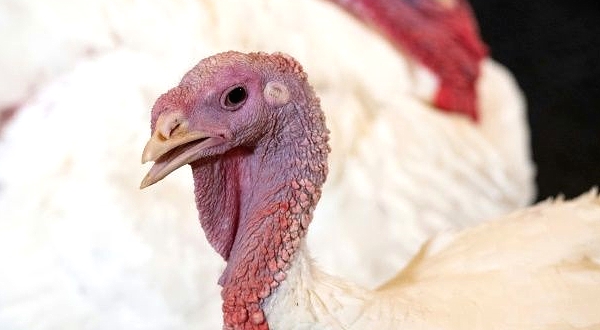
By Bob Chiarito
Chicago (AFP) — When Elysabeth Alfano hosts a Thanksgiving dinner for 12 next week at her home in Los Angeles, the menu will be traditional — with a few key changes that were all but impossible just a decade ago.
For dessert, she’ll have the staples that feature on nearly every American dinner table — pumpkin and apple pie. And the huge number of vegetable side dishes are not unusual.
But the “turkey” — the centrepiece of the meal — will be a vegan-stuffed breast made of chickpeas, wheat gluten, tomato paste, mushroom broth, seasonings and red wine.
Her main dish reflects a shift in eating habits in the United States: there are an increasing number of Americans choosing a vegetarian or vegan lifestyle. But they’re calling it something else.
While still only around three percent of Americans identify as vegan and six percent identify as vegetarians, more and more offerings are being marketed as “plant-based” — a term which food industry watchers say is more palatable to all.
“Veganism is often linked with some sort of deprivation,” explains Michael Robbins, spokesman for the three-year-old Plant Based Foods Association, which represents more than 100 companies including food giants like the Campbell Soup Company.
“Plant-based is generally associated with the general benefits of eating plants” and “has been shown in research to have a greater acceptance to a broader set of consumers,” he told AFP.
Indeed, nothing is more mainstream in America than fast food, and the giants are all in — Burger King is serving meatless Impossible Whoppers, and McDonald’s is test-marketing its plant-based burger.
“Just as the horse and buggy gave way to the car and the typewriter gave way to the computer, we are seeing more and more people go plant-based,” says Alfano, a chef, coach and lifestyle expert.
“In the first half of 2019, 248 million plant-based burgers were sold, 95 percent of which were bought by meat-eaters. The meat-eaters are the largest segment incorporating plant-based.”
Diet vs lifestyle
For decades in America, veganism has been linked to a way of life that transcends food choices.
Practitioners often don’t only refuse to consume any animal-based products — they also don’t wear clothes made from animal products like wool or leather.
Devotees of plant-based diets are generally all about the food, but they are happy to embrace the ethical debate as well, within reason.
Chicago-based artist Tammy Kohl grew up on a dairy farm in Wisconsin but has gradually shifted her diet, which has been completely plant-based for a year.
“To keep weight off by taking dairy out of my diet made sense. I did vegan cleanses and felt great and that inspired me,” said Kohl, who added that anti-animal cruelty efforts made cutting out meat easier.
But she noted: “I still wear leather. If you own leather, you might as well wear it.”
Holiday options
Jean Johnson, a sales consultant from Colorado, converted to a plant-based diet for health reasons and shies away from the term “vegan,” which she says conjures up an image to which she does not subscribe.
On Thanksgiving, she says she’ll stick to eating vegetable side dishes at a friend’s home — and isn’t all that worried if she happens to inadvertently consume animal products.
“I’m not so OCD about it where you can’t put any butter in the mashed potatoes — it’s such a small portion,” Johnson said.
Alfano, who splits her time between Los Angeles and Chicago, went completely vegan in 2016.
Her Thanksgiving plans are proof positive that the stigma which once surrounded non-carnivores, especially on traditional American holidays, is slowly fading away.
“What we have now that we didn’t have 10 years ago is good taste. We have convenience and we have price,” she says.
Kohl said she will celebrate the holiday with some relatives who raise beef cattle — a profession that hardly aligns with her veganism. But another family member is a vegetarian, and everyone gets along.
“I usually bring my own plate and very quietly fill it up,” Kohl said. “I’m not one of those preachy vegans.”
Fad or trend here to stay?
Johnson believes that her plant-based diet helped her beat cancer, and she identifies another benefit of plant-based diets these days — she has seen her grocery bills plummet.
“Meat and dairy, that’s not cheap stuff, whereas rice and beans, lentils and potatoes are cheap,” Johnson said.
Alfano agreed, saying it would also help Americans save money if healthier eating meant they could stop taking certain medications such as those to control cholesterol.
“It’s really expensive to be sick. If you can get off the pills, you’ll really be saving money,” she said.
Of course, meat producers are hardly on board for all this, but they’re not really worried either.
Hillary Makens, director of media relations for the National Cattlemen’s Beef Association, said vegans and vegetarians constitute a tiny portion of the US market, and her industry has bigger concerns.
“The beef industry has been competing against other proteins for a long time. When you think of chicken, pork, beans, peanut butter, all types of protein, it’s not really a new thing.” Makens said.
However, consumer research company Mintel said the number of new US food and drink products that mentioned “plant-based” grew 268 percent between 2012 and 2018.
Additionally, in a May 2019 report, Mintel said 38 percent of US consumers report trying to incorporate more plant-based items into their diet.
“Rarely in life do you ever get a triple winner — where one thing positively effects your health, positively effects your wallet, positively effects the environment and the planet,” Alfano says.






7cceaa49-89e0-4e23-bc72-54e78db55041b7759aac-7526-4a66-821b-465a86310bda.jpg)
a89f5c48-24b4-42c9-9a5d-e2459a5e5e3a8fe06e77-835a-4b93-9fab-f6eff5969b0b.jpg)
79d67ecd-50db-43a1-8ba0-66feb09dc2e0919a9e61-c7ad-4c65-9c4e-846533fda73f.jpg)
1d6dccdb-60d1-461e-b324-49ec0f85d3b7f736e3be-c7d8-4248-b83d-971861308a30.jpg)
2aef006e-a9f8-46fa-90da-981f980bbe9c40c838ee-5a65-4f99-aca3-f2f66169a39d.png)
4d7659ee-1ff7-4d81-ae46-3db33400a28fb5922d5d-8e23-4b3a-a1c0-2f2b92939e6a.png)